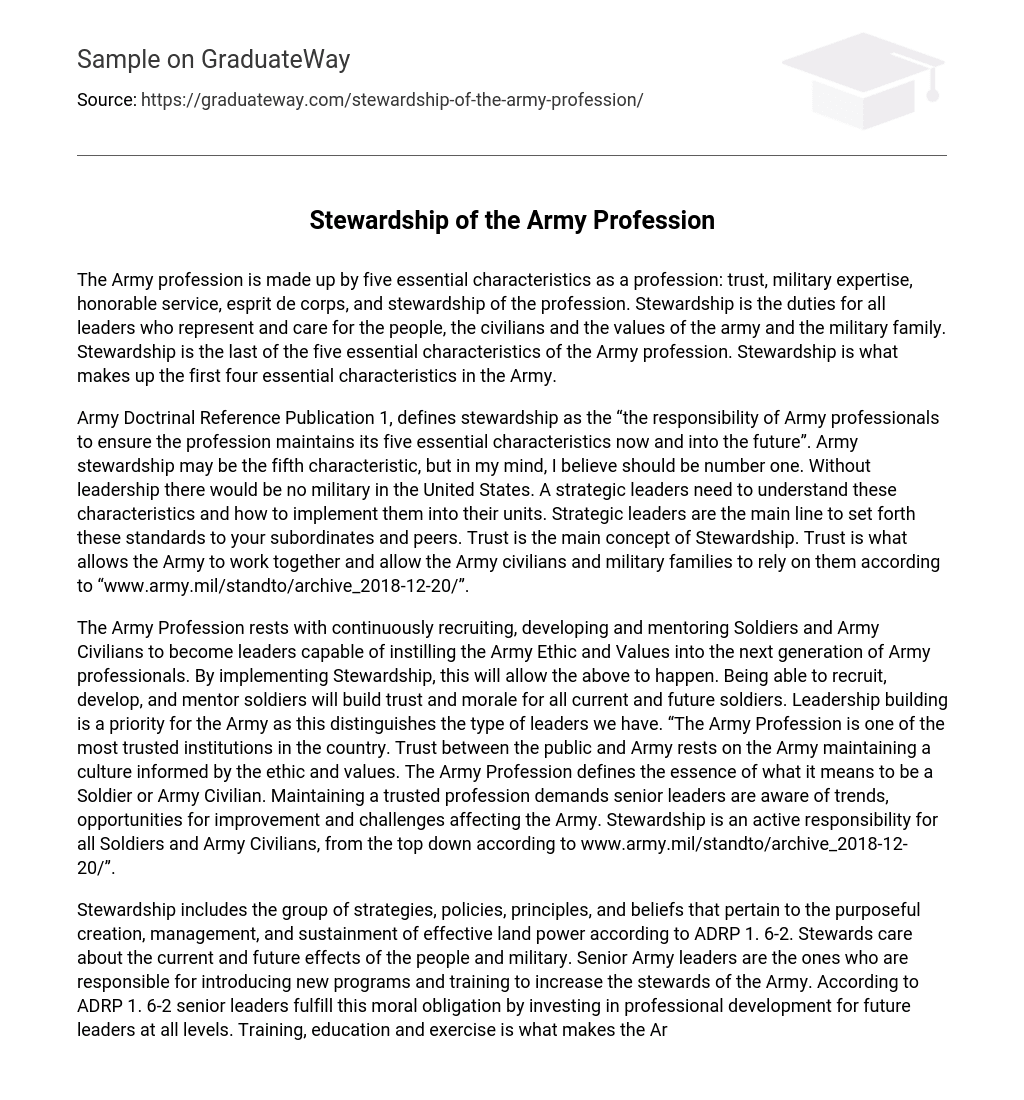The Army profession is made up by five essential characteristics as a profession: trust, military expertise, honorable service, esprit de corps, and stewardship of the profession. Stewardship is the duties for all leaders who represent and care for the people, the civilians and the values of the army and the military family. Stewardship is the last of the five essential characteristics of the Army profession. Stewardship is what makes up the first four essential characteristics in the Army.
Army Doctrinal Reference Publication 1, defines stewardship as the “the responsibility of Army professionals to ensure the profession maintains its five essential characteristics now and into the future”. Army stewardship may be the fifth characteristic, but in my mind, I believe should be number one. Without leadership there would be no military in the United States. A strategic leaders need to understand these characteristics and how to implement them into their units. Strategic leaders are the main line to set forth these standards to your subordinates and peers. Trust is the main concept of Stewardship. Trust is what allows the Army to work together and allow the Army civilians and military families to rely on them according to “www.army.mil/standto/archive_2018-12-20/”.
The Army Profession rests with continuously recruiting, developing and mentoring Soldiers and Army Civilians to become leaders capable of instilling the Army Ethic and Values into the next generation of Army professionals. By implementing Stewardship, this will allow the above to happen. Being able to recruit, develop, and mentor soldiers will build trust and morale for all current and future soldiers. Leadership building is a priority for the Army as this distinguishes the type of leaders we have. “The Army Profession is one of the most trusted institutions in the country. Trust between the public and Army rests on the Army maintaining a culture informed by the ethic and values. The Army Profession defines the essence of what it means to be a Soldier or Army Civilian. Maintaining a trusted profession demands senior leaders are aware of trends, opportunities for improvement and challenges affecting the Army. Stewardship is an active responsibility for all Soldiers and Army Civilians, from the top down according to www.army.mil/standto/archive_2018-12-20/”.
Stewardship includes the group of strategies, policies, principles, and beliefs that pertain to the purposeful creation, management, and sustainment of effective land power according to ADRP 1. 6-2. Stewards care about the current and future effects of the people and military. Senior Army leaders are the ones who are responsible for introducing new programs and training to increase the stewards of the Army. According to ADRP 1. 6-2 senior leaders fulfill this moral obligation by investing in professional development for future leaders at all levels. Training, education and exercise is what makes the Army leadership this way. The senior leader’s responsibility is to train, educate and share their knowledge with current and future leaders to continue the astonishing stewardship in the Army.
As a Steward of the Army I have gained plenty of knowledge from my senior leaders to educate and train my soldiers. Not having good senior leaders can hurt the army and reduce the success and trust of the civilians and military families. I will ensure to keep striving towards success for current and future soldiers below me to help develop them. Commissioned and Non-Commissioned Officers but work together at every level to ensure the army has programs and policies in place to produce the best Stewards in the Army.
Above all, Stewardship is a critical and valuable part of the Army today. Having senior leaders presenting programs to train and educate current and future leader’s shows that the Army is caring for civilians and military families. Stewardship presents a trustworthy clause to all the world.





